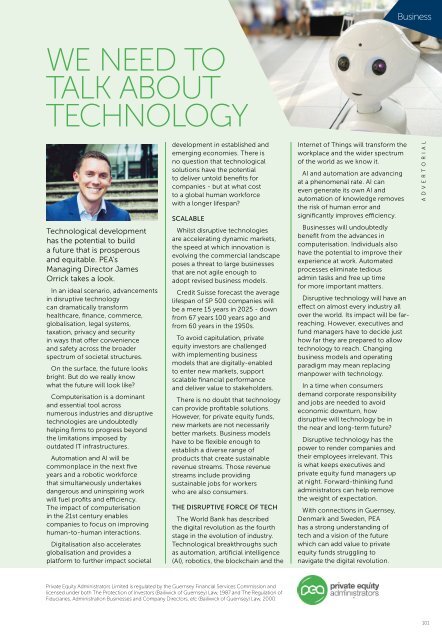En Voyage Issue#16 Flickbook
Create successful ePaper yourself
Turn your PDF publications into a flip-book with our unique Google optimized e-Paper software.
Business<br />
WE NEED TO<br />
TALK ABOUT<br />
TECHNOLOGY<br />
Technological development<br />
has the potential to build<br />
a future that is prosperous<br />
and equitable. PEA's<br />
Managing Director James<br />
Orrick takes a look.<br />
In an ideal scenario, advancements<br />
in disruptive technology<br />
can dramatically transform<br />
healthcare, finance, commerce,<br />
globalisation, legal systems,<br />
taxation, privacy and security<br />
in ways that offer convenience<br />
and safety across the broader<br />
spectrum of societal structures.<br />
On the surface, the future looks<br />
bright. But do we really know<br />
what the future will look like?<br />
Computerisation is a dominant<br />
and essential tool across<br />
numerous industries and disruptive<br />
technologies are undoubtedly<br />
helping firms to progress beyond<br />
the limitations imposed by<br />
outdated IT infrastructures.<br />
Automation and AI will be<br />
commonplace in the next five<br />
years and a robotic workforce<br />
that simultaneously undertakes<br />
dangerous and uninspiring work<br />
will fuel profits and efficiency.<br />
The impact of computerisation<br />
in the 21st century enables<br />
companies to focus on improving<br />
human-to-human interactions.<br />
Digitalisation also accelerates<br />
globalisation and provides a<br />
platform to further impact societal<br />
development in established and<br />
emerging economies. There is<br />
no question that technological<br />
solutions have the potential<br />
to deliver untold benefits for<br />
companies - but at what cost<br />
to a global human workforce<br />
with a longer lifespan?<br />
SCALABLE<br />
Whilst disruptive technologies<br />
are accelerating dynamic markets,<br />
the speed at which innovation is<br />
evolving the commercial landscape<br />
poses a threat to large businesses<br />
that are not agile enough to<br />
adopt revised business models.<br />
Credit Suisse forecast the average<br />
lifespan of SP 500 companies will<br />
be a mere 15 years in 2025 - down<br />
from 67 years 100 years ago and<br />
from 60 years in the 1950s.<br />
To avoid capitulation, private<br />
equity investors are challenged<br />
with implementing business<br />
models that are digitally-enabled<br />
to enter new markets, support<br />
scalable financial performance<br />
and deliver value to stakeholders.<br />
There is no doubt that technology<br />
can provide profitable solutions.<br />
However, for private equity funds,<br />
new markets are not necessarily<br />
better markets. Business models<br />
have to be flexible enough to<br />
establish a diverse range of<br />
products that create sustainable<br />
revenue streams. Those revenue<br />
streams include providing<br />
sustainable jobs for workers<br />
who are also consumers.<br />
THE DISRUPTIVE FORCE OF TECH<br />
The World Bank has described<br />
the digital revolution as the fourth<br />
stage in the evolution of industry.<br />
Technological breakthroughs such<br />
as automation, artificial intelligence<br />
(AI), robotics, the blockchain and the<br />
Internet of Things will transform the<br />
workplace and the wider spectrum<br />
of the world as we know it.<br />
AI and automation are advancing<br />
at a phenomenal rate. AI can<br />
even generate its own AI and<br />
automation of knowledge removes<br />
the risk of human error and<br />
significantly improves efficiency.<br />
Businesses will undoubtedly<br />
benefit from the advances in<br />
computerisation. Individuals also<br />
have the potential to improve their<br />
experience at work. Automated<br />
processes eliminate tedious<br />
admin tasks and free up time<br />
for more important matters.<br />
Disruptive technology will have an<br />
effect on almost every industry all<br />
over the world. Its impact will be farreaching.<br />
However, executives and<br />
fund managers have to decide just<br />
how far they are prepared to allow<br />
technology to reach. Changing<br />
business models and operating<br />
paradigm may mean replacing<br />
manpower with technology.<br />
In a time when consumers<br />
demand corporate responsibility<br />
and jobs are needed to avoid<br />
economic downturn, how<br />
disruptive will technology be in<br />
the near and long-term future?<br />
Disruptive technology has the<br />
power to render companies and<br />
their employees irrelevant. This<br />
is what keeps executives and<br />
private equity fund managers up<br />
at night. Forward-thinking fund<br />
administrators can help remove<br />
the weight of expectation.<br />
With connections in Guernsey,<br />
Denmark and Sweden, PEA<br />
has a strong understanding of<br />
tech and a vision of the future<br />
which can add value to private<br />
equity funds struggling to<br />
navigate the digital revolution.<br />
ADVERTORIAL<br />
Private Equity Administrators Limited is regulated by the Guernsey Financial Services Commission and<br />
licensed under both The Protection of Investors (Bailiwick of Guernsey) Law, 1987 and The Regulation of<br />
Fiduciaries, Administration Businesses and Company Directors, etc (Bailiwick of Guernsey) Law, 2000.<br />
101
















